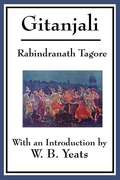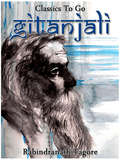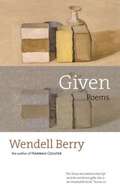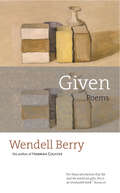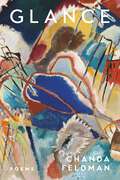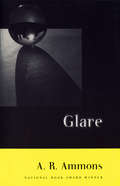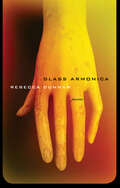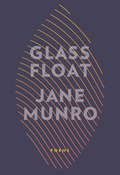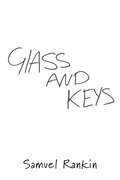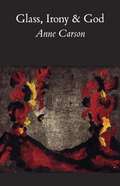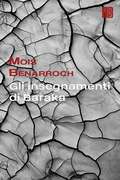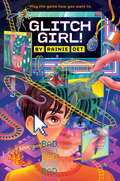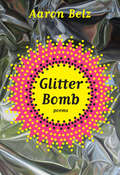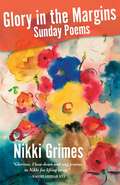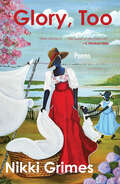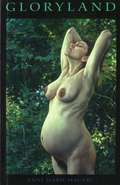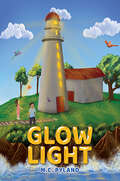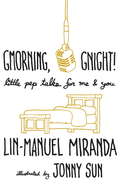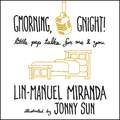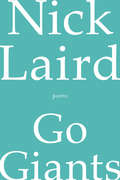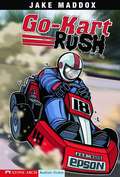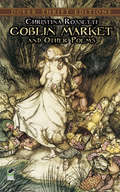- Table View
- List View
Gitanjali
by Rabindranath TagoreI have carried the manuscript of these translations with me for days, reading it in railway trains, or on the top of omnibuses and in restaurants, and I have often had to close it lest some stranger would see how much it moved me. These lyrics-- which are in the original full of subtlety, of rhythm, of untranslatable delicacies of colour, of metrical invention-- display in their thought a world I have dreamed of all my live long. The work of a supreme culture, they yet appear as much the growth of the common soil as the grass and the rushes. A tradition, where poetry and religion are the same thing, has passed through the centuries, gathering from learned and unlearned metaphor and emotion, and carried back again to the multitude the thought of the scholar and of the noble. -W. B. Yeats
Gitanjali: Revised Edition Of Original Version (Classics To Go #289)
by Rabindranath TagoreThrough the immortal verses of the Gitanjali, Tagore reveals the mysticism and sentimental beauty of Indian culture.
Given: New Poems
by Wendell BerryFor five decades Wendell Berry has been a poet of great clarity and purpose. He is a writer whose imagination is grounded by the pastures of his chosen place and the rooms and porches of his family's home.
Given: Poems
by Wendell BerryFor five decades Wendell Berry has been a poet of great clarity and purpose. He is an award-winning writer whose imagination is grounded by the pastures of his chosen place and the rooms and porches of his family's home. In Given, the work is as rich and varied as ever before. With his unmistakable voice as the constant, he dexterously maneuvers through a variety of forms and themespolitical cautions, love poems, a play in verse, and a long series of Sabbath Poems that resulted from Berry's recent Sunday morning walks of meditation and observation. Berry's work is one of devotion to family and community, to the earth and her creatures, to the memories of the past, and the hope of the future. His writing stands alongside the work of William Carlos Williams and Robert Frost as a rigorous American testament.
Glance: Poems
by Chanda FeldmanGlance, the second collection of poetry by Chanda Feldman, explores the experiences of a Black and white and Jewish American family that moves abroad to find respite from contemporary racial violence. Spanning diverse landscapes in Israel and the Middle East, Europe, and the United States, the poems grapple with the inability to escape brutalities and prejudices, asking where—and if—it is possible to find a sense of home and community. Feelings of belonging and estrangement, safety and threat, as well as questions of identity, both of the self and the family, drive the speaker to look inward and outward in order to navigate the world. Though never breaking free from their attendant anxieties, Feldman’s poems revel in the beauty of environment and place as they traverse global spaces, from the sea to the city, from the playground to the museum, from orchards to the synagogue, seeking a home in the world.
Glare: Poetry
by A. R. Ammons"Glare is a high-energy, relentlessly self-aware collision with the whole of life."--Albert Mobilio, Salon A superb long poem by the contemporary master of the form, Glare comprises two sections, "Strip" and "Scat Scan." The poem demonstrates, yet again, why A. R. Ammons's poetic voice is a national treasure: by turns cosmic, self-inflating, self-deflating, eloquent, intimate, bawdy, comic, precise--and always unmistakably his own.
Glaring Through Oblivion
by Serj TankianStunning poems of darkness and light by the Grammy Award–winning System of a Down singer, songwriter, activist, and author of Cool Gardens.In this strikingly illustrated book of original poetry, System of a Down fans gain an intimate glimpse into the soul of the band's frontman, Serj Tankian. For fans stirred by the cerebral lyrics of SOAD albums Hypnotize, Mesmerize, Steal This Album!, Toxicity, and their first, self-titled breakthrough—and for everyone enthusiastic about Serj’s solo projects—this essential, one-of-a-kind collection of Tankian’s innermost thoughts and feelings is a must-read. Unique artwork by Roger Kupelian punctuates nearly 70 poems—almost none of which have ever been published before. Glaring through Oblivion is an indispensable find for fans.
Glass Armonica: Poems
by Rebecca DunhamThe “exquisitely crafted poems” of this prize-winning collection weave together past and present to explore touch, trauma, and the female body (G.C. Waldrep).The eighteenth-century glass armonica, a musical instrument whose sound emits from rotating water-filled vessels, has long held the power to mesmerize with its hauntingly sorrowful tones. Just as its song—which was once thought to induce insanity—wraps itself in and around the mind, Rebecca Dunham probes the depths of human psyche, inhabiting the voices of historical female “hysterics” and inciting in readers a tranquil unease.These are poems spoken through and for the melancholic, the hysteric, the body dysmorphic—from Mary Glover to Lavinia Dickinson to Freud’s famed patient Dora. Dunham offers unsettling depictions of uninvited contact—of hands laid upon the female body, of touch at times unwanted, and ultimately unspeakable from behind the hysteric’s “locked jaws.”Winner of the 2013 Lindquist & Vennum Prize for Poetry
Glass Float
by Jane MunroLines that attend to shore, air, water, sand, birds, other women; in their gathered particulars they bring us close to the concavities, the complex familiarity and mystery of conscious experience.
Glass and Keys
by Samuel RankinGlass and Keys is the first book published by Samuel Rankin. It features the very first poems he ever wrote as well as the latest. To read this book is to travel through the evolution of Sam’s poetic journey from writing behind a till on the back of receipts to his most recent and most developed material. This, above all, is an insight into the mind of a young writer who does not shy away from talking about his miseries, fears and views on the modern world. Whether you like fast-paced rhymes, laid-back first-person commentary or thought-provoking literature… Glass and Keys has it all.
Glass, Irony, and God
by Anne Carson6 poems including The Glass Essay, The Truth About God, TV Men, The Fall of Rome: A Traveller's Guide, Book of Isaiah, and The Gender of Sound.
Gli insegnamenti di Baraka
by Mois Benarroch Ivano ConteIl celebre poema di Mois Benarroch, in italiano. Salutato come uno dei massimi poeti israeliani, le poesie di Benarroch sono state pubblicate in una dozzina di lingue, comprese l'urdu e il cinese. Julia Uceda ritiene che nella sua poesia Benarroch abbia in mano la memoria del mondo, mentre José Luis Garcia Martin pensa che i suoi poemi siano più che poesia, sono un documento. Testimone del suo tempo, Benarroch iniziò a scrivere poesia quando aveva 15 anni, in inglese, e ha sempre scritto nella sua lingua madre, lo spagnolo. "Se avessi un voto per la nomination per il premio nobel, lui sarebbe un candidato." Klaus Gerken, Ygdrasil editor. La sua reputazione è cresciuta regolarmente e i suoi libri sono stati pubblicati in Spagna, in Israele e negli Stati Uniti. Ha vinto il premio letterario Prime Minister's Literary Awards nel 2008 e il premio Yehuda Amichai nel 2012.
Glitch Girl!
by Rainie Oet&“Each poem is as raw as it is beautiful.&” —Alex Gino, author of ALA Stonewall Award-winning novel MelissaA middle grade novel in verse about a young trans girl who uses a computer game to process an ADHD diagnosis, isolation, and her relationship to gender for fans of Too Bright to See by Kyle Lukoff.J—&’s life is consumed by the roller coaster video game Coaster Boss, and by the power she exerts over the pixelated theme park attendees. Her life outside the game, however, is less controllable.Me.I&’m such a big space. I break the universe, a glitch.She's navigating ADHD, the loneliness of middle school, and an overwhelming crush on a girl named Junie. J— is convinced that Junie sees her as who she really is, a person who isn&’t &“bad&” just because she doesn't stay quiet and sit still in class. As a person who is realizing that the name she's been given doesn&’t really fit her. And that maybe boy doesn&’t either.Glitch Girl! follows J— from fifth to seventh grade, from the beginning to the end of her obsession with Coaster Boss, and to the start of a new friendship. When J— meets Sam, a nonbinary classmate, she begins to realize that it's okay to not fit into neat, pixelated boxes.
Glitter Bomb: Poems
by Aaron BelzFrom the author of Lovely, Raspberry (Persea 2010) comes a collection of new poems which alternate between deadpan and slapstick in their madcap depictions of human foibles. "The poems in Glitter Bomb pull no punches: irreverent, devastating, even nasty at times, they capture the present moment in all its absurdity and hyper-reality. 'Lampwise by altarlight' (pace Dylan Thomas), Aaron Belz keep his eye on the object: often hilarious, he is also wise." -Marjorie Perloff
Glory in the Margins: Sunday Poems
by Nikki Grimes"Glory in the Margins is a gift and a challenge: a collection that could be well-worn by pastors and prisoners, could be healing in both a hospital room or busy auditorium, and could offer inspiration in both the quiet of personal devotion or a bustling sanctuary." —Dana VanderLugt, Reformed JournalNew York Times bestselling author and poet Nikki Grimes explains, "A study of scripture reveals that Jesus spent a lot of time with people in the margins. As an African American, I live in the margins, and I can tell you that it's a place most of us would rather not be. And yet, I know there is always glory to be found in the margins because of the Lord's presence in, and with us." "As Poet Laureate of my Grace Brethren Church in Southern California, it's my job to distill the heart of the weekly sermon into a poem. I dive into each week's chosen scripture, viewing it from my own perspective as Black, as woman, as poet, always a little left of center, and looking for the glory to be found in the margins of life, and of the text. Of course, those of us who live in the margins are not what anyone expects, and the very notion that God might speak through us, through me, may seem a bit wild. But he does. 'I will pour out my spirit on all flesh,' said the Lord. God's busy in the hearts of all who call on him."Glory in the Margins is published under Paraclete Press's Iron Pen imprint. In the book of Job, a suffering man pours out his anguish to his Maker. From the depths of his pain, he reveals a trust in God's goodness that is stronger than his despair, giving humanity some of the most beautiful and poetic verses of all time. Paraclete's Iron Pen imprint is inspired by this spirit of unvarnished honesty and tenacious hope.
Glory, Too: Poems
by Nikki GrimesWinner of the Coretta Scott King Award, and New York Times bestselling author Nikki Grimes introduces Glory, Too, a soul-stirring collection of poetry that delves into the depths of faith, hope, and the human experience by one of America's preeminent black poets. In a marriage of poetry, faith, and worship, Ms. Grimes' poems illuminate the Scriptures that grace every Sunday of the year. Her inimitable voice and imagination offer glimpses of glory we might not otherwise see, throughout the seasons of the year. With lyrical precision and spiritual insight, she invites readers on a journey of reflection, weaving together themes of grace, redemption, and the enduring power of God's love throughout the year. As the companion volume to her previous book Glory in the Margins: Sunday Poems, Glory, Too resonates with authenticity and depth, giving testimony to the transformative power of poetry and the enduring hope found in the embrace of God's eternal grace. High Style Louboutin stilettos are recognizable at a distance. Those shiny red soles tell you everything. When Gucci handbags are in a room, they virtually shout. Now, I'm not much for labels, but I've noticed how God's garments stand out. Take the suit, a second skin made of holiness—a rare fabric, that usually itches, at first until the wearer gets used to it; Beyond that, God's personal style is all about the layered look: the silk of compassion, golden threads of kindness woven through the vest, humility cinching in the waist, meekness and patience falling to the ankles, and love thickly draped across the shoulders. The clothing God designs is never mistaken for anyone's but his. And when we're wise enough to don his attire, we look like more than a million.
Gloryland
by Anne Marie MacariGloryland re-examines motherhood, death, birth, and rebirth, drawing on religious and secular creation myths to enact a feminist religion. Bold, rich lyrics reveal the grand in the domestic, claiming the physical as an essential part of the -female experience, declaring that to live fully in the body is the truest, bravest, and most glorious form of worship.
Glow Light
by M. C. PylandLighthouses symbolize direction, safety, and hope for those navigating the vast, open waters. They stand as beacons, guiding you safely back home, through dark and uncertain conditions, or offering a steady presence on a bright, carefree day.These towering lights, found on coastlines and islands, help boats find their way through any challenge. Lighthouses come in many colors, shapes, and sizes, yet their purpose remains the same: to withstand the harshest weather and provide a constant, unwavering light.As you turn each page, let these lighthouses lead you on a journey of wonder. From danger to delight, discover what lies beyond the horizon as you follow the rhymes and see where they take you.
Gmorning, Gnight!: Daily mindfulness from the creator of Hamilton the Musical
by Lin-Manuel Miranda~ NEW YORK TIMES BESTSELLER ~ From the creator of Hamilton: The Musical and star of His Dark Materials, this beautifully illustrated book of pep talks will inspire you at the beginning and end of each day."When the world is bringing you down, Gmorning, Gnight! will remind you that you are awesome." - Booklist"A perfect choice for anyone who wants to blow away negativity and avoid getting stuck in the comments section of life." - The HeraldWhether you want to change your morning mindset or calm your head before you sleep, Lin-Manuel Miranda has just the right pep talk for you. He wrote these original sayings, aphorisms, and poetry for himself as much as for others. But as Miranda was catapulted to international fame and his audience grew, these messages began to delight thousands across the world.Now, GMORNING, GNIGHT! gathers the best of his daily greetings into a beautiful collection illustrated by acclaimed artist (and fellow Twitter favorite) Jonny Sun. Full of comfort, positivity and motivation, this little book is a touchstone for anyone who needs a quick lift at the start and end of each day.
Gmorning, Gnight!: Daily mindfulness from the creator of Hamilton the Musical
by Lin-Manuel MirandaFrom the creator of Hamilton: The Musical and star of His Dark Materials comes a book of affirmations to inspire readers at the beginning and end of each day.'Good morning. Do NOT get stuck in the comments section of life today. Make, do, create the things. Let others tussle it out. Vamos!'Before he inspired the world with Hamilton and was catapulted to international fame, Lin-Manuel Miranda was inspiring his Twitter followers with words of encouragement at the beginning and end of each day. He wrote these original sayings, aphorisms, and poetry for himself as much as for others. But as Miranda's audience grew, these messages took on a life on their own. Now Miranda has gathered the best of his daily greetings into a beautiful collection. Full of comfort and motivation, Gmorning, Gnight! is a touchstone for anyone who needs a quick lift.(P)2018 Random House Audio
Go Giants: Poems
by Nick LairdAn inventive new collection by the writer whom Colm Tóibín called "an assured and brilliant voice in Irish poetry." Go Giants, Nick Laird's stunning third volume of poetry, is full of "epic ambition." In a collection that's "easily his most accomplished to date...[Laird] gives everything of himself in a poetry as expansive and thought-provoking as his considered response to an infinitely complicated universe needs it to be" (The Guardian). Laird boldly engages with topics ranging from fatherhood and marriage to mass destruction and the cosmos. Go Giants is a brash, brave, and wildly imaginative new collection. From Go Giants: Go in peace to love and serve the. Go and get help. Go directly to jail. Go down in flames. Go up in smoke. Go for broke. Go tell Aunt Rhody. Go tell the Spartans. Go to hell. Go into detail. Go for the throat.
Go-Kart Rush
by Jake MaddoxWhen Tony turns twelve and moves up to the next class of kart racing, he worries that he will never be able to compete against the older boys who have more experience.
Gobble It Up!: A Fun Song About Eating!
by Jim ArnoskyIf you were a wild. raccoon, You'd hunt at night by the light of the moon. You'd catch some crawdads where they crawl, And gobble them up -- shells and all! It's suppertime in the wild--and the animals are hungry! Clap your hands and sing along with renowned wildlife artist and folk musician Jim Arnosky in this catchy, factual picture book/song that follows animals as they engage in everyone's favorite daily activity--eating!
Goblin Market
by Christina RossettiSisters Lizzie and Laura meet the goblin fruit sellers in the evening. Laura eats the fruit and begins to waste away from longing. Lizzie finds a way to trick the goblins and save her sister. Goblin Market was originally published in 1862 and has been republished several times since. At this time, very few stories had heroic females, but this poem provides a female who takes action - she deals with the sly goblins to save her sister, she does not wait passively for someone else to provide the rescue.
Goblin Market and Other Poems
by Christina RossettiAn important and often-quoted literary figure, the English poet Christina Rossetti (1830-1894) wrote some of the most beautiful and voluptuous poetry in the English language. Like Emily Dickinson, she lived in self-imposed isolation, writing of God and lost love with a sensuality and passion that seemed to emanate from the soul.This edition of 53 works combines a number of her best-known sonnets, ballads, and shorter lyrics with her long masterpiece, the narrative fable Goblin Market. A haunting fairy tale in verse, Goblin Market was once labeled a children's poem, yet its intricate symbolism and themes of temptation, sin, and redemption mark it for an adult audience. Among other works included in this choice collection are "The Convent Threshold," "Up-hill," "Cousin Kate," "Winter: My Secret," "Maude Clare," "No, Thank You, John," and "After Death."
